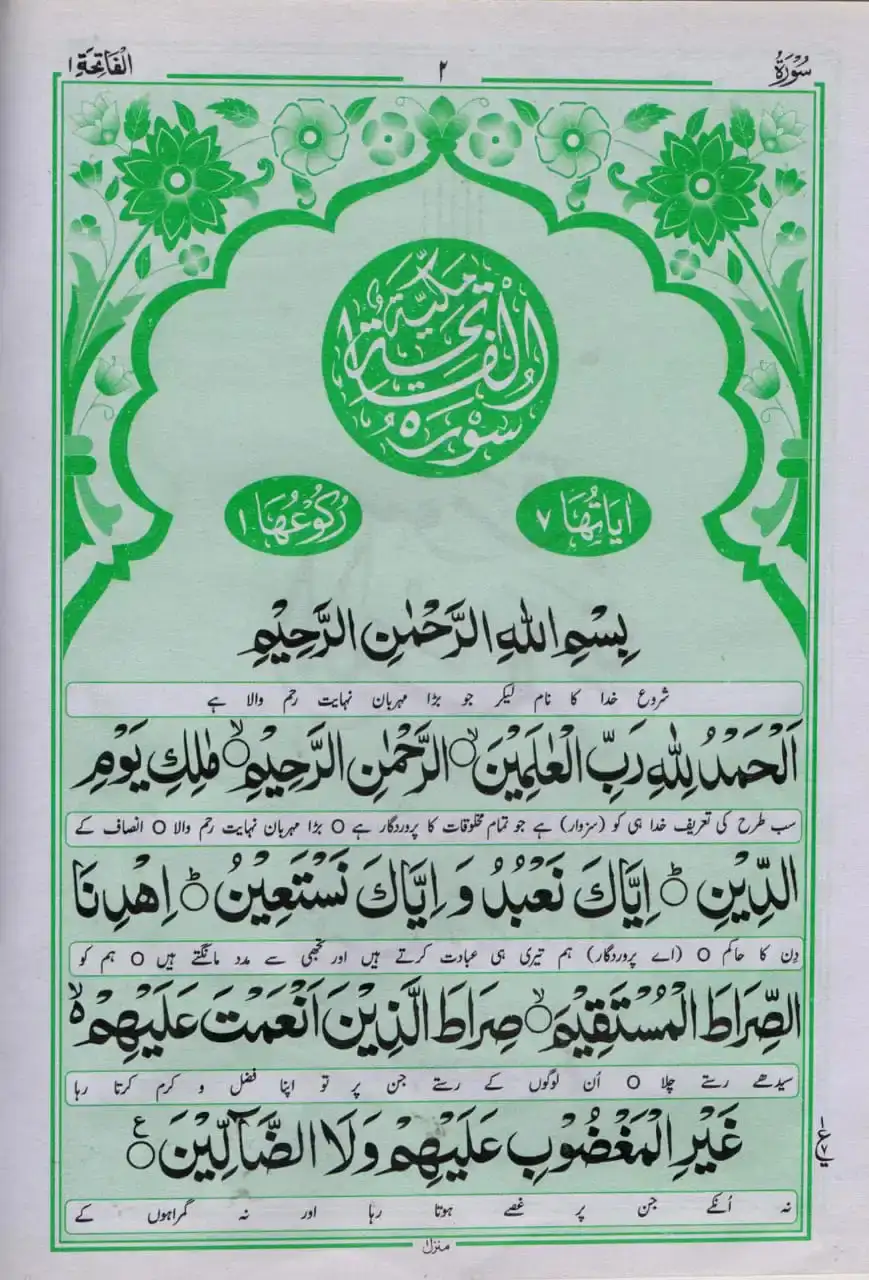Surah Al-Fatiha, known as The Opening, holds a unique and revered position in Islam. It is the first chapter of the Quran and is recited in every unit of the Muslim prayer (Salah). This chapter is not only a supplication but also an essential spiritual guide, reminding believers of their relationship with Allah and seeking His guidance.
What is Surah Fatiha?
Surah Fatiha comprises seven verses, and it encapsulates the core of a Muslim’s belief. It expresses gratitude, worship, and the request for guidance. The chapter is a prayer from the servant to the Creator, asking for mercy, protection from misguidance, and steadfastness on the right path.
Surah Fatiha Tarjuma (Translation in Urdu)
In the provided image, the Urdu translation of Surah Fatiha is as follows:
- Bismillah Hir Rahman Nir Raheem: شروع اللہ کے نام سے جو بڑا مہربان نہایت رحم والا ہے
- Alhamdu Lillahi Rabbil ‘Alameen: سب تعریف اللہ کے لئے ہے جو تمام جہانوں کا پالنے والا ہے
- Ar Rahmanir Raheem: بڑا مہربان نہایت رحم والا ہے
- Maliki Yawmid Din: جزا کے دن کا مالک ہے
- Iyyaka Na’budu Wa Iyyaka Nasta’een: ہم تیری ہی عبادت کرتے ہیں اور تجھ ہی سے مدد مانگتے ہیں
- Ihdinas Siratal Mustaqeem: ہمیں سیدھا راستہ دکھا
- Siratal Lazeena An’amta ‘Alaihim Ghairil Maghdoobi ‘Alaihim Walad Daal’leen: ان لوگوں کا راستہ جن پر تو نے انعام کیا نہ کہ ان کا جن پر غضب ہوا اور نہ گمراہوں کا
Each verse of this Surah reflects key themes of worship, servitude, and asking for the favor of Allah.
| Surah Baqarah ki last 2 Ayat with Urdu translation |
| Surah Baqarah Last 3 Ayat with Urdu Translation |
| Surah Baqarah Last 2 Ayat PDF |
| Surah Baqarah Last Ruku: Recite with Insight |
The Meaning and Importance of Surah Fatiha
Surah Fatiha is recited as a form of connection between Allah and His worshippers. It starts with Bismillah, which serves as a reminder that all acts should begin with invoking Allah’s name, who is merciful. The chapter continues by praising Allah, the Lord of all worlds, recognizing His compassion, justice, and sovereignty over the Day of Judgment.
The central message of Surah Fatiha is Iyyaka Na’budu Wa Iyyaka Nasta’een—declaring absolute reliance on Allah for worship and assistance. The prayer concludes with the believer asking for the path of those whom Allah has blessed, avoiding the way of those who have strayed or earned His anger.
This chapter is crucial in every prayer, making it an integral part of a Muslim’s daily life, and provides spiritual nourishment and a constant reminder of the need for divine guidance.
Why Recite Surah Fatiha?
Surah Fatiha is not just a requirement for prayers but a means of invoking blessings and mercy. It reminds the reciter of the importance of acknowledging Allah as the Sustainer and Guide in all aspects of life. Reciting it with understanding can enhance a believer’s connection with Allah, making it a powerful act of devotion.
Benefits of Reciting Surah Fatiha
- Source of Protection: Reciting Surah Fatiha offers protection from misguidance and harm. It serves as a shield for those seeking Allah’s help.
- Healing Power: It is often referred to as a cure for both spiritual and physical ailments. Known as “Ash-Shifa” (The Cure), it is recited for healing purposes.
- Guidance in Life: The Surah serves as a reminder to seek Allah’s guidance in every step, keeping one on the straight path.
By understanding the meaning of Surah Fatiha, believers can recite it with greater concentration and devotion, making their prayers more meaningful.
FAQs:
The main message of Surah Fatiha is to praise Allah, recognize Him as the Lord of all worlds, and seek His guidance for the right path while avoiding the ways of misguidance and wrath.
Surah Fatiha is called ‘The Opening’ because it is the first chapter of the Quran and is recited at the beginning of every prayer, symbolizing the start of one’s devotion to Allah.
Reciting Surah Fatiha is obligatory in every unit (rak’ah) of the Muslim prayer. It establishes a direct connection with Allah, seeking His guidance and mercy, and is essential for a valid prayer.




